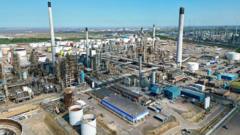Is Trucking Ready to Embrace New Technology?

The Evolution of Trucking: From Traditional Methods to Digital Platforms
The trucking industry has undergone significant transformations over the past few decades. Once dominated by traditional methods of communication and scheduling, the sector is now experiencing a digital revolution. Drivers like Jared, who have spent years on the road, share their experiences of how technology has changed their work lives for the better, while also raising concerns about the implications of this shift. With the rise of "Uberized" platforms revolutionizing the way freight is managed, the trucking landscape is evolving rapidly. This article explores the nuances of this change, the benefits and challenges it brings, and what the future might hold for truck drivers.
The Journey of a Modern Trucker
Jared’s story provides a compelling snapshot of how the trucking industry has evolved. As a veteran truck driver, he transitioned from hauling perishable goods to working with artists on tour, moving essential equipment for their performances. His experience reflects a broader trend where drivers are increasingly finding specialized niches within their field. What is especially noteworthy is how technology has streamlined operations for modern truckers.
In Jared's early years, communication was cumbersome. The reliance on payphones and pagers made it difficult to find work when on the road. Today, the scenario is vastly different. The digital landscape allows drivers to connect with potential employers instantly. With the touch of a button, they can secure jobs, track their routes, and manage their schedules all from their mobile devices.
The Impact of Digital Platforms
The emergence of digital platforms, likened to Uber, has created a significant shift in freight transportation. These platforms match truckers with companies needing to transport goods, offering a wealth of opportunities. However, this convenience comes with its challenges, particularly concerning wages. Jared notes a stark decrease in rates from $3 per mile during the pandemic to just $1.10 today for certain routes. This trend raises questions about the sustainability of incomes in the industry.
Challenges Facing Truck Drivers Today
Despite the conveniences of digital platforms, many truck drivers are expressing concerns over reduced earnings and job security. Organizations like Teamsters Canada highlight the stagnation of wages over the last 25 years and warn of the risks associated with gig-style work. The existence of numerous small trucking firms, with most employing fewer than five people, creates an environment where competition is fierce, often pushing down prices and resulting in lower wages.
Moreover, rising fuel costs further exacerbate the financial strain on truckers. As the trucking industry grapples with these challenges, there is an urgent call for better protections for drivers and a reevaluation of compensation structures. It is essential for truckers not just to have access to jobs, but to ensure they are compensated fairly for their work.
Technology as a Double-Edged Sword
While technology has simplified many aspects of trucking, it also presents a potential threat to job security. Innovations such as AI and automated driving are rapidly making their way into the industry. Companies like Freightera are leveraging technology to enhance efficiency and streamline operations, but as these technologies become more sophisticated, the risk of job displacement looms large. The balance between technological advancement and job preservation is a critical conversation for the industry moving forward.
Freightera: A Case Study in Digital Innovation
Freightera, a Vancouver-based company, illustrates how digital solutions can benefit both drivers and companies. Unlike many platforms that dictate pricing, Freightera empowers carriers to set their own rates based on their operational needs. This unique approach not only fosters a more equitable marketplace but also helps drivers maintain profitability amid rising costs.
Co-founder Eric Beckwitt emphasizes that finding work used to be a daunting task, comparable to "finding a needle in a haystack." With Freightera, drivers can access a vast network of routes and demands in mere seconds. The company continually adapts to the evolving landscape, looking to integrate AI to enhance the booking process and mitigate issues like missing paperwork or unexpected charges.
Global Perspectives on Digital Trucking
The digital transformation of trucking is not limited to North America. Countries like Kenya have embraced technology to optimize their freight systems. Platforms like LORI facilitate efficient management of truck fleets, ensuring that vehicles are utilized effectively without returning empty. This efficiency not only reduces operational costs but also contributes to a decrease in carbon emissions from the trucking industry.
As trucking accounts for over half of CO2 emissions in trade-related transport, solutions that enhance efficiency could have significant environmental benefits. It is crucial for the industry to adopt technologies that not only improve profitability but also support sustainability goals.
The Future of Trucking: Automation and AI
As the industry stands on the brink of automation, the potential for fully driverless trucks raises important discussions about the future of work in trucking. Companies like Aurora are already testing autonomous vehicles on public roads, paving the way for a future that could redefine trucking. While the technology exists, societal acceptance and regulatory frameworks remain significant hurdles to widespread adoption.
For many drivers, such as Jared, the thought of a completely automated freight system remains a distant reality. The industry has thrived on human expertise for centuries, and while technology can enhance operations, the human touch is still seen as irreplaceable. The conversation around automation needs to consider not just efficiency but also the impact on livelihoods.
Conclusion: Navigating the Future of Trucking
The trucking industry is at a pivotal moment, balancing the benefits of digital innovation with the challenges of wage stagnation and job security. As companies continue to adopt new technologies, it is essential for stakeholders to engage in dialogue about fair compensation, worker protections, and the ethical implications of automation. The future of trucking will depend on how well the industry navigates these complexities while ensuring that drivers are valued and supported.
As we reflect on the evolution of trucking, one must ask: How can the industry leverage technology to create a sustainable future while prioritizing the well-being of its drivers? The answers may shape the next chapter of this vital sector.
FAQs
What is the impact of digital platforms on trucking wages?
Digital platforms have made it easier for truckers to find work, but they have also contributed to wage decline due to increased competition and market saturation. Drivers often report lower rates compared to previous years.
How does technology improve efficiency in trucking?
Technology streamlines operations by allowing drivers to access job listings, manage routes, and track deliveries all from their devices. It also helps companies optimize logistics and reduce idle time for trucks.
What are the potential threats of automation in trucking?
Automation poses a risk of job displacement for truck drivers. While it may enhance efficiency and reduce costs, it raises concerns about the future of employment in the industry.
As the trucking industry evolves, how do you see technology shaping its future? #Trucking #DigitalTransformation #FutureOfWork
Published: 2025-07-21 23:30:11 | Category: technology



